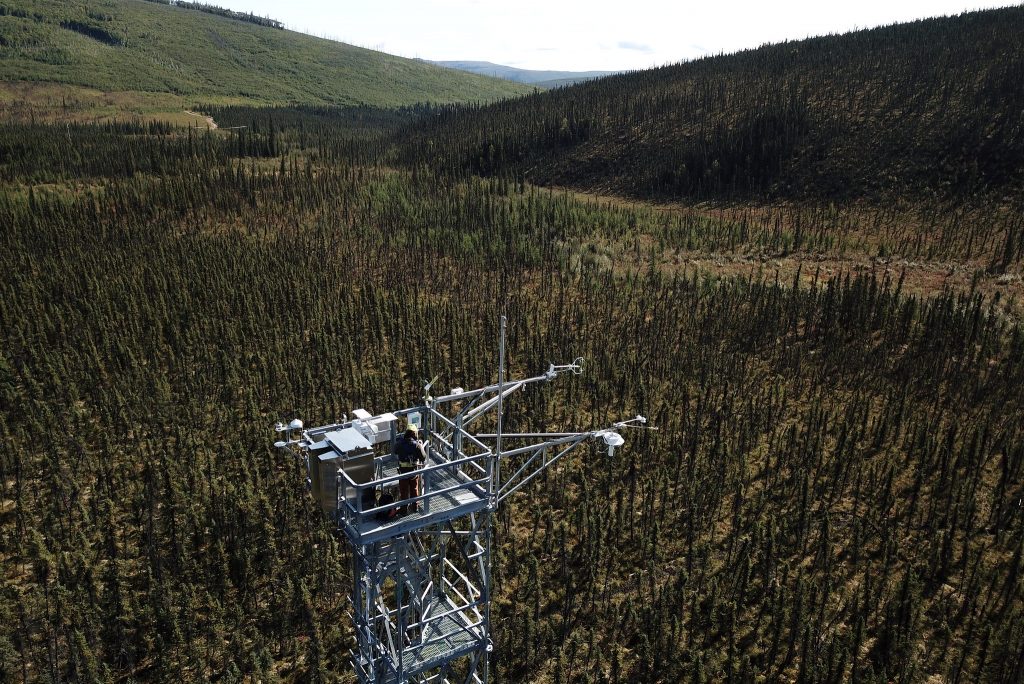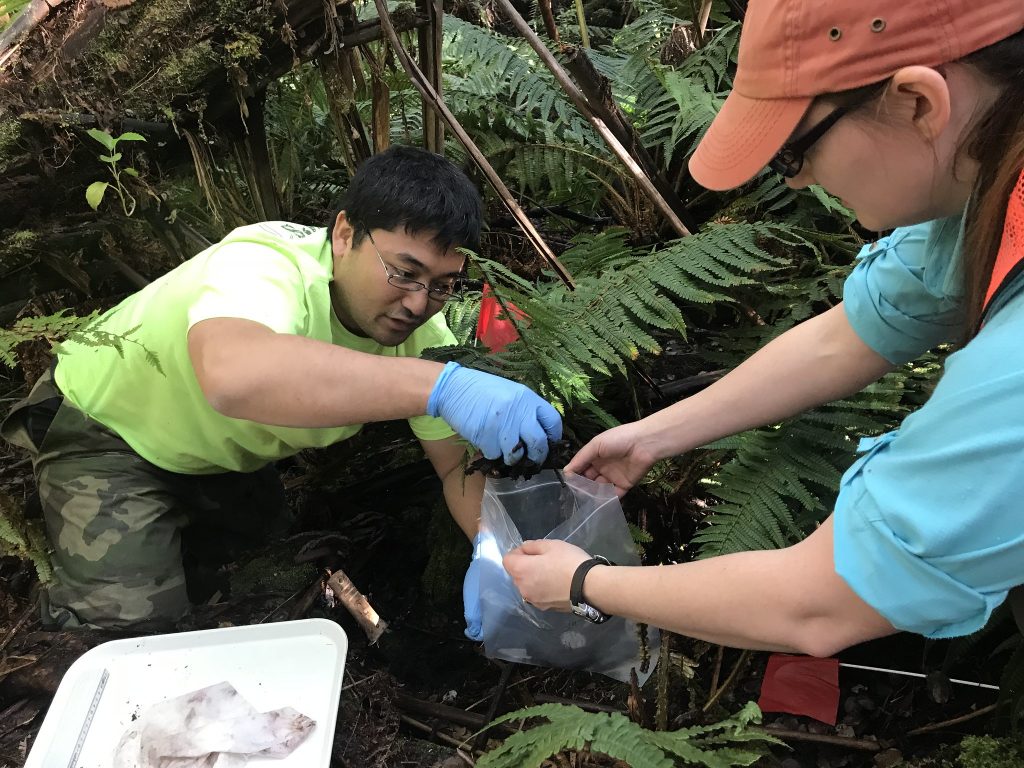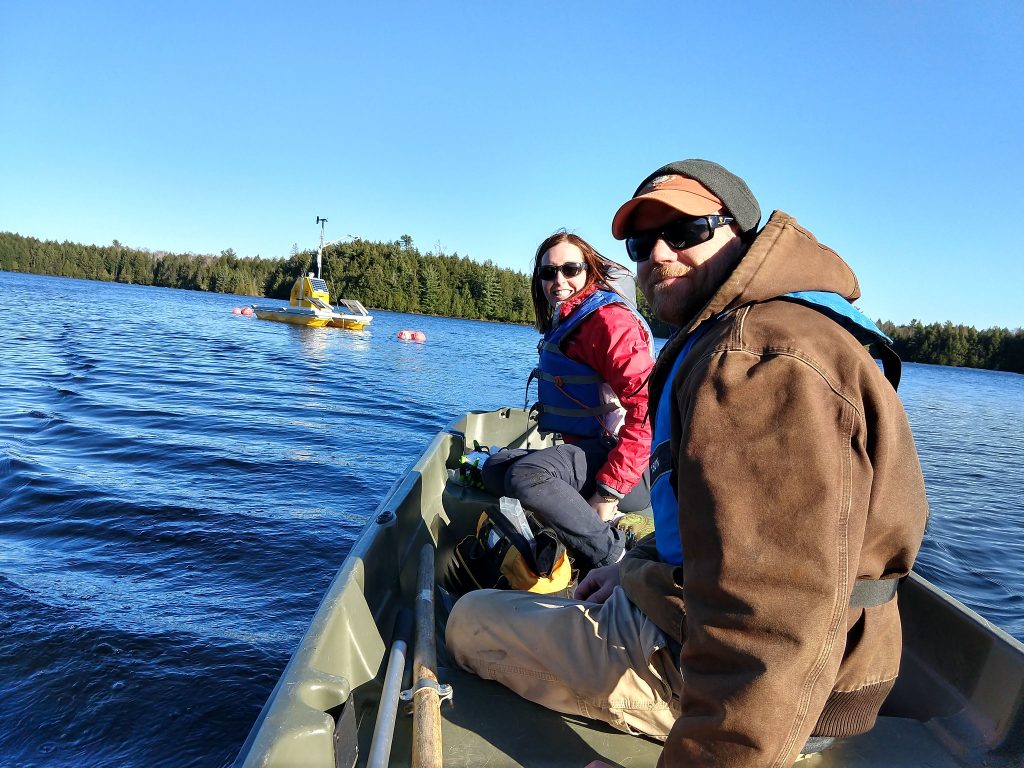NEON-ESA Early Career Scholars Share Their Experience at ESA2020
by the National Ecological Observatory Network
Scientific conferences are exciting and inspiring for a number of reasons, one of which being the multitude of ideas and people coming together. The presenting of research findings and participating in scientific dialogue are important experiences in the career development of researchers. To support their growth in 2020, NEON and the Ecological Society of America established a NEON-ESA Early Career Scholars (NECS) program to cultivate and support a group of early career scholars.
The chosen scholars received registration to the 2020 ESA Annual Meeting, which centered on the theme of “Harnessing the ecological data revolution.” While attending the virtual conference, the scholars were able to view a variety of NEON-related sessions led by NEON staff, in addition to the vast number of events across the ecological spectrum as part of the ESA program. They also participated in a virtual meet-and-greet event the week prior to the conference to network with each other, NEON program science staff, and other researchers using NEON data to talk about their own research ideas and projects.
Read some excerpts from our Early Career Scholars talking about their experience!
“As one of the faculty members leading a new training initiative in machine learning in my state (Arkansas AI-Campus), I applied for the award in order to learn more about NEON datasets and become better prepared to expand our current curriculum to include one or more ecological informatics focused projects. I had previously explored the data portal a bit, but I do not currently have any close colleagues working with NEON datasets, there is so much available, and so many different data types (including many I am unfamiliar with!), and so I found it a bit difficult to get a holistic view of how it all fit together on my own.
Attending the meeting and participating in the workshops and other activities helped me to gain a much deeper appreciation for all the effort and coordination that have gone in to collecting and documenting the NEON data and making it publicly available and usable, as well as the exciting opportunities for research they make possible. It was great to get hands-on experience working with the data in the workshops, learn about the Code Resources page where we could submit any code developed as part of our training program, and learn about educational resources developed by participants in the QUBES Faculty Mentoring Network and other tutorials already available through NEON. The workshops and perspectives of the NEON scientists, as well as the perspectives of other Early Career Scholars working with NEON data, were incredibly valuable for me in this early stage of project develop ment to get a sense of how ecologists are using NEON data, what interesting questions they are asking, and how they are integrating data from other long-term monitoring networks.”
– Emily Bellis
Arkansas State University

Caribou-Poker Creeks Research Watershed (BONA), AK. Photo courtesy of Batelle, NEON Program
“As a lecturer in Quantitative Data Science at the School of Forest Resources and Conservation (University of Florida), this year’s Annual Meeting topic, “Harnessing the ecological data revolution,” was very relevant to me. One of the things I am particularly interested in is using large data sets in the classroom and teaching quantitative methods using ‘real’ data. NEON’s session “Bringing open data and R to the undergraduate classroom” was a valuable workshop in that sense, bringing together great educators such as Dr Zimmerman and Dr Naithani. I was excited to hear from them and get tips on how to set up a course like this – I will be launching one at my university in spring 2021! There was also a special session on creating effective data management plans, which gave me information and tools I can use when I teach this topic – or assist my colleagues.
Aside from sessions and talks, as a NEON Early Career Scholar, I also got to benefit from workshops organized by NEON. While I had the fortune of attending a NEON Data Institute in the past (2018), I was very excited to have another opportunity to learn more about the NEON data and tools available. My past experience was very much centered around remotely sensed vegetation data and Python tools, and this time around I attended a workshop that focused on the programming language R and biodiversity data. In addition, I learned more about NEON’s water quality data at this workshop; data sets I have not yet had the chance to explore. The number of tutorials available on the NEON website is impressive, and I plan to use a number of these in my upcoming undergraduate course on big data and the environment. All in all, the virtual format did made it more difficult to interact and network – so I definitely plan to attend an ESA Annual Meeting in person in the future – but ESA and NEON did a terrific job in sharing tools and disseminating information.”
– Geraldine Klarenberg
University of Florida
“From the pre-ESA event, I was able to virtually ‘meet’ other Scholars and learn about their research interests and their individual interests in NEON. I had initially thought I would be the only Postdoc. But It was nice to meet PhD students, postdocs, and assistant professors in this cohort. It was amazing to learn about how much data NEON collects (in a standardized way) and makes freely available to researchers.
In addition to NEON’s data, it was great to learn about the many tutorials that NEON also makes available which helps researchers better understand and use the data and use the data. To say the least, I was very impressed. NEON’s resources are not limited to data and tutorials. It was great to learn about NEON Assignable Assets is another very interesting feature that researchers can explore/exploit – where NEON infrastructure can be used for research. This is astounding, because it can allow for the possibility of research that would have otherwise been very challenging or impossible without NEON.
Being a NEON-ESA Early Career Scholar reminded me that I belonged to a larger community of scholars and made my first ESA more engaging since everything was virtual due to the COVID-19 pandemic. The NEON presenters made it such that during the workshops and the breakout sessions, participants were actively involved. I also got the chance to ask (and answer) questions. This interaction made me learn more about NEON, NEON Data, NEON Assignable Assets, and NEON additional resources (tutorials/YouTube channel), which would not have been possible with just surfing the web. And it inspired me to brainstorm on projects that would utilize the huge dataset NEON makes available. I am very excited about my career future and the role NEON data could play in shaping it.”
– Magdalene Ngeve
University of Maryland

Field techs at Pu’u Maka’ala Natural Area Reserve (PUUM), HI. Photo courtesy of Batelle, NEON Program
“As someone in the early stages of my academic career, still formulating questions of interest, it was inspiring to see scientists coming together across disciplines and research systems. My interests span ecophysiology, plant microbial biology, community ecology, and forest management, so it was stimulating to watch presentations in each of these categories and to be exposed to the work of researchers engaged in those fields.
[…] Overall, I was inspired by the theme behind this year’s ESA annual meeting, harnessing the ecological data revolution, and how well the NEON-ESA Early Career Scholars Program fit into this theme, with one of the goals of NEON being to provide access to data that facilitates larger scale ecological research endeavors. Having the experience to work through some of the data with peers and NEON staff on an interactive Zoom call helped me learn more about the data availability and the inner workings of the NEON research sites. During one of the workshops, I discovered NEON’s great repository of tutorials, including R programming tutorials—it was great to see that they are of varying levels of difficulty, making them accessible for people with different knowledge backgrounds. This resource is something I could definitely see myself using in the classroom as a teaching assistant, helping undergraduate students learn how to program in R. Through the NEON-ESA Early Career Scholars Program, I was able to learn from researchers doing the science to tackle big questions and take on big data, while simultaneously beginning to access NEON data for use in my own research pursuits. I look forward to leveraging NEON data as I further develop my research questions, and I hope to participate in more workshops and events in the future.”
– Dyonishia Nieves
University of Minnesota
“Above all, the most valuable part of my ESA 2020 experience was meeting more senior scientists in my field. I was a speaker in Symposium 14, on the patterns and drivers of large-scale fungal diversity. After a live Q&A session, the other speakers and I made time for a “virtual happy hour” over Zoom, where we pondered over the reasons for discrepancies in our results, and where I received specific feedback on my statistical methods.
The theme of this year’s meeting was “Harnessing the ecological data revolution.” As a scholar who is actively working with NEON data, this was encouraging to me, as many speakers presented specifically on analyzing and combining large datasets.”
– Clara Qin
University of California Santa Cruz
“This was the first year I attended the ESA conference. I have wanted to for several years, but my field work schedule always prevented me from attending. A conference of this size would be overwhelming under any circumstances, and the virtual format made it hard to make connections with other attendees. Because of this, the ESA Early Career Scholar program was particularly useful. It was really great to have a small group of attendees to work with. Many of the ECS participants said it was also their first time attending ESA, which made me feel a lot more comfortable.
The workshops that NEON provided were also incredibly useful. I have been very intimidated by the amount data and the different types of data, and haven’t taken full advantage of what is available. The workshops really helped me familiarize myself with the data portal. It was also incredible helpful to see the R packages that I can use to download and organize the data. I can’t wait to get to work with the NEON data!”
– Catherine Scher
Duke University
“Attending ESA 2020 as a NEON Early Career Scholar was an interesting and informative experience. In my opinion, NEON did a very good job navigating the complexities introduced by the virtual format of the conference. The networking events facilitated by NEON were both enjoyable and illuminating. I particularly appreciated the opportunity to have one-on-one conversations with high level NEON employees about the details of various data products. The insight provided by these interactions will be very useful as I go about executing my research agenda. Everyone in the meetings was friendly and collaborative, and I was impressed by the level of professionalism of the presentations. In short, the NEON Early Career Scholar events were the most valuable experience I had at ESA this year.”
– Daniel Sousa
California Institute of Technology
“The 2020 Ecological Society of America Annual Meeting was my first time attending an ESA conference. Coming from the fields of paleontology and functional morphology, having an opportunity to not only attend but also present at the conference was of huge value as I continue my career. Despite the online nature of this year’s meeting, I was still able to engage with attendees about my talk and learned a lot from other presentations about how functional traits are being used in ecology and what challenges are being addressed in the work on ecosystem functioning. My research is transitioning more and more to include questions about ecological patterns and processes, and the wealth of data available in NEON will be incredibly useful as I make this transition.
Part of the personal and professional development I experienced at ESA was due to the various NEON workshops and information sessions during the meeting. Big datasets, especially those outside your field of expertise, can be really daunting, so having an opportunity not only to ask questions and work with data in real data, but also to have resources available as an Early Career Scholar after the meeting is finished is a real asset. The continued digitization of NEON data, including trait data on e.g. beetles, is a development I’m particularly excited to watch as the project continues. As I transition to my new role as a AAAS Science and Technology Policy Fellow, I am excited to bring in the perspective of policy and development to the ecological questions I have, and the NEON dataset will undoubtedly be useful as I continue my career.”
– Collin VanBuren
Ohio State University

Field techs at Crampton Lake (CRAM), WI. Photo courtesy of Batelle, NEON Program
“Participating in the NEON Early Career Scholars program gave me more of an opportunity to connect with others and feel a part of the conference than I would have had otherwise. I particularly enjoyed and appreciated the Zoom events–the Virtual NEON Connect event as well as both of the workshops that I attended (the Access & Explore NEON Data Workshop and the Work with NEON Biodiversity Data). These helped me feel more engaged with the conference; the scheduled events provided some structure, and the NEON talks also served as a nice jumping off point when I was looking for presentations to view.
Further, it was great to learn more about the resources, and particularly the tutorials available through NEON. I use R frequently in my work, and so having available R scripts and a package specific to NEON is so valuable. I appreciated walking through these R scripts in the workshops, which helped clarify how to connect different datasets to answer the questions most relevant to my work.
Overall, participating in the NEON Early Career Scholars program this year made it very clear to me what a valuable resource the NEON network of sites is. It encouraged me to think more about how I might expand the work I’m doing and incorporate data that I wasn’t aware of previously. I also really enjoyed hearing of how others use the data in ways I never would have imagined. I anticipate continuing to explore and use the resources provided by NEON in my current work, and when scoping out resources for future projects.”
-Shelby Weiss
Portland State University
“By forming a community, NEON brings together the science of the natural world with the science of human behavior and remote sensing lidar technology to find solutions to the complex coupled natural-human system problems. After watching a lot of NEON-ESA early career scholars’ presentations, I was very impressed with how they integrated NEON with their research in different fields. From a macrosystems biology perspective, it was very exciting to see how NEON data are applied and analyzed at continental scales. NEON data becomes a new platform to communicate scientific ideas other than a traditional ecological data source.”
– Di Yang
University of Montana
NEON is proud to have been able to work with ESA to enable this cohort of early career scientists to attend ESA 2020 and to network in a virtual world that was hard to navigate this past year. We’re glad to hear about their experiences and look forward to seeing what they do in the future!